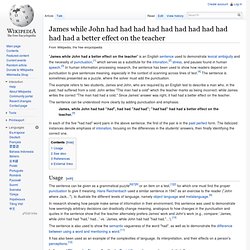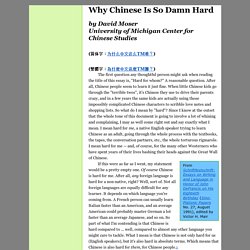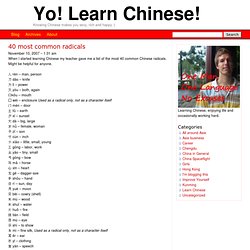

Teaching Tenses to ESL Students. Waste your life, learn to speak a foreign language. Waste your life, learn to speak a foreign languageBy Anthony Browne We all know le problème: we are a nation of monoglots, linguistically challenged and so culturally inferior and economically constrained.

Only one in four of us can claim to speak in foreign tongues, whereas our chic European chums babble away in a veritable Babel. European governments have lobbied, and the British Government has responded: from 2010 every primary school shall teach foreign. It’s a further good intention paving the road to ruin of our education system. We should shrug off our linguistic hang-ups, and instead of reinforcing language teaching, abolish it tout de suite.Ordering everyone to learn another language is as pointless as ordering everyone to dig holes and fill them up. All the time we spend learning another language, we should spend instead learning something useful — like economics, business studies, politics, law or computer science.
From The TimesDecember 23, 2002 An interesting point of view. Let them learn Mandarin: why foreign languages are good for the brain. - BadLinguistics. Buffalo buffalo Buffalo buffalo buffalo buffalo Buffalo buffalo. The sentence's meaning becomes clearer when it's understood that it uses three meanings of the word buffalo: the city of Buffalo, New York, the somewhat uncommon verb "to buffalo" (meaning "to bully or intimidate"), as well as the animal buffalo.

When the punctuation and grammar are expanded, the sentence could read as follows: "Buffalo buffalo that Buffalo buffalo buffalo, buffalo Buffalo buffalo. " The meaning becomes even clearer when synonyms are used: "Buffalo bison that other Buffalo bison bully, themselves bully Buffalo bison. " Sentence construction Bison engaged in a contest of dominance.
This sentence supposes they have a history of such bullying with other buffalo, and they are from upstate New York. A comic explaining the concept The sentence is unpunctuated and uses three different readings of the word "buffalo". Marking each "buffalo" with its use as shown above gives: Buffaloa buffalon Buffaloa buffalon buffalov buffalov Buffaloa buffalon. Usage. James while John had had had had had had had had had had had a better effect on the teacher. The example refers to two students, James and John, who are required by an English test to describe a man who, in the past, had suffered from a cold.

John writes "The man had a cold" which the teacher marks as being incorrect, while James writes the correct "The man had had a cold. " Since James' answer was right, it had had a better effect on the teacher. The sentence can be understood more clearly by adding punctuation and emphasis: James, while John had had "had", had had "had had"; "had had" had had a better effect on the teacher.[5] Usage[edit] The sentence can be given as a grammatical puzzle[6][7][8] or an item on a test,[1][2] for which one must find the proper punctuation to give it meaning.
The sentence is also used to show the semantic vagueness of the word "had", as well as to demonstrate the difference between using a word and mentioning a word.[11] In the novel "Flowers for Algernon" written by Daniel Keyes, it was used as proof of intelligence. See also[edit] References[edit] Why Chinese Is So Damn Hard. (简体字:为什么中文这么TM难?)

(繁體字:為什麼中文這麼TM難?) The first question any thoughtful person might ask when reading the title of this essay is, "Hard for whom? " A reasonable question. After all, Chinese people seem to learn it just fine. When little Chinese kids go through the "terrible twos", it's Chinese they use to drive their parents crazy, and in a few years the same kids are actually using those impossibly complicated Chinese characters to scribble love notes and shopping lists.
If this were as far as I went, my statement would be a pretty empty one. If you don't believe this, just ask a Chinese person. Everyone's heard the supposed fact that if you take the English idiom "It's Greek to me" and search for equivalent idioms in all the world's languages to arrive at a consensus as to which language is the hardest, the results of such a linguistic survey is that Chinese easily wins as the canonical incomprehensible language. 1.
Beautiful, complex, mysterious -- but ridiculous. 2. 40 most common radicals. November 10, 2007 – 1:31 am When I started learning Chinese my teacher gave me a list of the most 40 common Chinese radicals.

Might be helpful for anyone. Univ. of Pittsburgh: Polish Language Website.